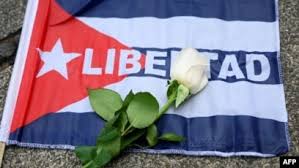
Cuba Turns Off Critics’ Open Mic
Compartimos el editorial del 31 de diciembre del New York Times, donde se refleja la protesta -que está teniendo repercusión internacional- por las acciones de represión realizadas ayer por el gobierno cubano ante una iniciativa de la artista Tania Bruguera, que iba a realizarse en la Plaza de la Revolución. Fueron detenidos, entre otros, Reinaldo Escobar -marido de Yoani Sánchez-, Eliécer Ávila, del movimiento «Somos +«, y miembros de la redacción del diario 14yMedio. A Yoani Sánchez se le impidió abandonar su residencia.
Bruguera, de 46 años y que ha residido los últimos tres años en Nueva York, describió esta iniciativa como «una ‘performance’ en la cual se está haciendo uso del arte para entrar en un tejido social». La artista deseaba ofrecer una «tribuna pública» para que quienes así lo desearan pudieran expresar pacífica y públicamente sus ideas sobre el futuro de la nación, a partir del restablecimiento de relaciones entre Cuba y Estados Unidos. Para la convocatoria, se había creado una plataforma en las redes sociales llamada «Yo también exijo». Al final, la performance no se pudo realizar.
La artista dirigió hace unos días una «carta abierta» a los presidentes de Cuba, Raúl Castro, y de EE.UU., Barack Obama, en la que exponía la idea de que los cubanos debían salir a las calles este pasado martes «a celebrar no el fin de un bloqueo/embargo sino el principio de sus derechos civiles».
Como se señala en el editorial del diario norteamericano, con estas acciones, el gobierno cubano le da armas a los críticos de la histórica decisión del presidente Obama.
Es nuestra opinión que estas acciones represivas no detendrán la nueva dinámica de la oposición cubana en el contexto que surge luego del acuerdo entre ambos gobiernos. El gobierno cubano muestra con ello debilidad, así como temor a los cambios que serán inevitables en el tiempo.
Es un momento de retos para todos. El gobierno decidió ayer asumir el suyo con represión, y la oposición con una propuesta pacífica que mediáticamente fue un éxito, y puso a la dictadura a la defensiva. La protesta, a pesar de las acciones del gobierno, se diversificará y continuará.
Las acciones de represión del gobierno cubano, repetimos, sólo sirven a los enemigos del cambio, dentro y fuera de Cuba. Pero las voces del cambio continuarán su marcha.
América 2.1
———————————————
EL EDITORIAL DEL NEW YORK TIMES:
The Cuban artist Tania Bruguera, who splits her time between the United States and Havana, traveled to Cuba in recent days seeking to pull off a bold experiment. She called on Cubans from all walks of life to meet at Havana’s iconic Revolution Square on Tuesday at 3 p.m., where they would take turns at a microphone to outline their vision for the new era in the country. Word of the event, which was billed as both a performance and a street protest, was shared on social media using the hashtag #YoTambiénExijo, which means “I also demand.”
Ms. Bruguera’s plan was the first test of whether the Obama administration’s decision to normalize relations with Cuba earlier this month would prod the Castro regime to be more tolerant of critical voices. Disappointingly, but not surprisingly, the government barred prominent critics, including Ms. Bruguera, from reaching the square. Some were detained and others were reportedly prevented from leaving their homes. In the end, the performance wasn’t held.
Authorities in Cuba appear to have wrestled with how to prevent Ms. Bruguera’s project from turning into a mass gathering of critics. They allowed her to travel to the island, though she had publicized her project well in advance. In recent days, officials from the state-run arts council summoned her for a meeting. In a statement, the council said it had made clear to her that her plan was “unacceptable,” because of the location and the “ample media coverage” in outlets that are critical of the government. Officials proposed that the event be held instead at a cultural site, according to the statement, and said that the government would “reserve the right” to bar people whose “sole interest is to be provocative.”
It became clear early on Tuesday which people authorities had in mind. State security personnel detained journalist Reinaldo Escobar, the husband of popular dissident blogger Yoani Sánchez, outside their home and prevented her from leaving, according to the digital news site the couple runs, 14yMedio. Eliécer Ávila, a young government critic who leads the political movement ‘Somos +’ — which means, “there are more of us,” was taken into custody alongside Mr. Escobar.
By stifling critical voices, the Cuban government is showing its unwillingness to tolerate basic freedoms most citizens in the hemisphere enjoy. This move, unfortunately, will amplify the criticisms of those who opposed Mr. Obama’s historic shift on Cuba policy.
Heavy-handed tactics by the Castro government will give them ammunition next year, when Republicans will control both chambers of Congress, to stymie the Obama administration’s steps to ease the embargo through executive authority and dim the prospects of legislative change to pare back the web of sanctions Washington imposes on Cuba. That result would be a shame and, in the long run, self-defeating for Havana.
